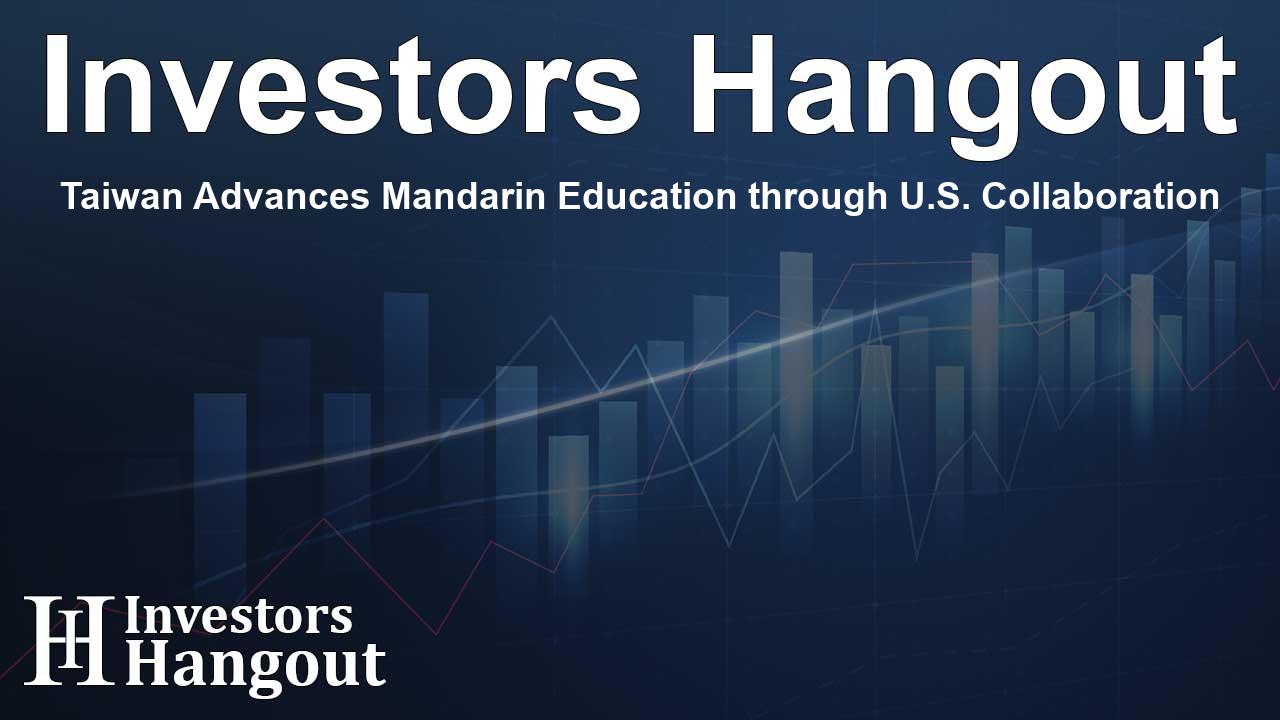Taiwan Advances Mandarin Education through U.S. Collaboration

Taiwan's Commitment to Mandarin Education
At a key language education event, representatives from Taiwan showcased their commitment to excellence in Mandarin education. This annual convention was organized by the American Council on the Teaching of Foreign Languages (ACTFL) and held at the Pennsylvania Convention Center. The significant involvement of Taiwanese institutions highlighted the dedication to promoting Mandarin language studies.
Partnerships in Language Education
The delegation, comprised of members from the Foundation for International Cooperation in Higher Education of Taiwan (FICHET) and various Taiwanese educational authorities, emphasized the role that partnerships play in enhancing language education. This event represented a collaboration among 20 institutions that aimed to strengthen Taiwanese Mandarin education on a global scale.
Symposium on U.S.-Taiwan Educational Cooperation
A notable highlight of the conference was the first Taiwan-U.S. Mandarin Education Symposium, which aimed to deepen educational ties between Taiwan and the United States. This symposium featured prominent speakers, including Dr. Randall Nadeau from the Fulbright Taiwan Foundation, and fostered important discussions on educational strategies and collaboration in Mandarin instruction.
Contributions from Educational Leaders
Key figures from the U.S. Mandarin education landscape were invited to share their experiences and insights, further enriching the dialogue that unfolded during the symposium. Noteworthy attendees included the new education commissioner from Alabama and representatives from both New Jersey City University and the University of Pennsylvania. Their input underscored the growing importance of Mandarin in the K-12 education system across the U.S.
Quality and Support in Mandarin Instruction
Ambassador Tom Chih-Chiang Lee pointed out Taiwan's esteemed reputation as a hub for Mandarin education. He discussed the supportive learning environment, abundant teaching resources, and the unique blend of traditional and modern culture that makes Taiwan an attractive destination for students wishing to learn Mandarin.
Growing Appeal of Taiwan as a Learning Destination
Currently, over 3,000 American students are studying Mandarin in Taiwan, a figure that continues to rise as the country enhances its offerings and accessibility. Taiwan's strategic initiatives aim to strengthen its position as a premier location for Mandarin education.
U.S.-Taiwan Educational Initiatives
The Taiwan-U.S. Education Initiative and the Mandarin Education 2025 Program are pivotal in expanding Taiwanese influence in the U.S. educational sector. With 21 Taiwanese universities partnering with 70 institutions across the U.S., the impact of these collaborations is evident.
Mandarin Learning Centers in the U.S.
This initiative includes the establishment of five Mandarin learning centers in key U.S. locations, reflecting the growing demand for Mandarin education. In a proactive move to enhance this program, Taiwan has dispatched numerous Mandarin teachers to facilitate these learning opportunities.
Showcasing Taiwanese Culture and Education
The Learning Mandarin in Taiwan Pavilion, with its innovative design, showcased Taiwan as a tech-driven nation, connecting educational programs with global technological advancements. The participating universities offered vibrant and diverse Mandarin programs aimed at attracting international students.
Networking and Collaboration Opportunities
The Taiwan Night reception at the Philadelphia Marriott Downtown served as an excellent networking opportunity. Here, Taiwanese leaders engaged with U.S. representatives, fostering connections that could lead to future collaborations in Mandarin education.
Conclusion: Strengthening Educational Ties
Through initiatives like the Taiwan-U.S. Mandarin Education Symposium, Taiwan continues to assert itself as a leading player in the field of language education. Its commitment to building partnerships and promoting cultural exchange is crucial for improving Mandarin education globally.
Frequently Asked Questions
What was the purpose of the ACTFL conference for Taiwan?
The conference aimed to showcase Taiwan's strengths in Mandarin education and build partnerships with U.S. institutions.
Who participated in the Taiwan-U.S. Mandarin Education Symposium?
Prominent educators and representatives from Taiwanese and U.S. organizations, including ambassadors and education commissioners, took part in the discussions.
How many American students study Mandarin in Taiwan?
Over 3,000 American students are currently studying Mandarin in Taiwan, highlighting the growing interest.
What initiatives support Mandarin education in the U.S.?
The Taiwan-U.S. Education Initiative and the Mandarin Education 2025 Program are key frameworks that support collaborative efforts.
Why is Taiwan considered a top destination for learning Mandarin?
Taiwan offers a high-quality educational environment, diverse programs, and cultural immersion, making it an attractive destination for Mandarin learners.
About Investors Hangout
Investors Hangout is a leading online stock forum for financial discussion and learning, offering a wide range of free tools and resources. It draws in traders of all levels, who exchange market knowledge, investigate trading tactics, and keep an eye on industry developments in real time. Featuring financial articles, stock message boards, quotes, charts, company profiles, and live news updates. Through cooperative learning and a wealth of informational resources, it helps users from novices creating their first portfolios to experts honing their techniques. Join Investors Hangout today: https://investorshangout.com/
Disclaimer: The content of this article is solely for general informational purposes only; it does not represent legal, financial, or investment advice. Investors Hangout does not offer financial advice; the author is not a licensed financial advisor. Consult a qualified advisor before making any financial or investment decisions based on this article. The author's interpretation of publicly available data shapes the opinions presented here; as a result, they should not be taken as advice to purchase, sell, or hold any securities mentioned or any other investments. The author does not guarantee the accuracy, completeness, or timeliness of any material, providing it "as is." Information and market conditions may change; past performance is not indicative of future outcomes. If any of the material offered here is inaccurate, please contact us for corrections.